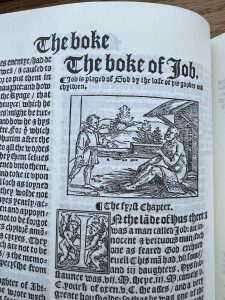Is the resurrection even relevant anymore? (1) Perhaps we should ask, “Was the resurrection ever relevant?” Postmodern cultures, whether ancient or modern, have always stumbled over God’s sovereignty over life and death as revealed in Scripture. (2) What does the story of the resurrection do for a society that has pretty much seen, heard, and […]
Written by: Pastor Joel

Perhaps we should ask, “Was the resurrection ever relevant?” Postmodern cultures, whether ancient or modern, have always stumbled over God’s sovereignty over life and death as revealed in Scripture. (2) What does the story of the resurrection do for a society that has pretty much seen, heard, and done it all? Certainly this doctrine more than any other is a watershed.
For those (3) who have journeyed with Job through the written record of his calamity, the need for relevance is clear. If there is no purpose beyond this life’s suffering then the book of Job is just another timeless illustration of universal absurdity to be catalogued alongside ancient myths like Sisyphus and more modern tales like The Stranger or A Serious Man. But Job ultimately teaches a lesson to the reader that is more faith than fable.
The plea of verses 23-24 erupts from the wisdom literature theme of man’s search for meaning. Is there a purpose behind this life and a sense to the surrounding senselessness? Or is one’s existence just so much absurdity? Should a man just subscribe to the mindset of eat, drink, and be merry, for tomorrow we die because there is only death to look forward to? (5)
Job’s plea (6) here is in harmony with the theme of the book, the very first word of which is “man,” indicating that this is a record of the human experience and struggle that is common to all (7). He desires that the narrative of his life would fit within some greater narrative, a metanarrative, that would contextualize his suffering and heartbreak, and perhaps provide him at least with some sort of postmortem vindication.
Job’s plea is unrealistic unless there is a God, because nothing is “forever.” Even the rocks will eventually wash out into the sea. (8) Job’s calamitous life will be both miserable and pointless, for no one will get to know the story by reading his words, unless somehow this prayer is answered. Job’s plea is for tomorrow / the future to be life not death, and nothing can provide for this except the resurrection. (9)
The narrator never seeks to sanitize Job’s testimony even as the dark matters in his heart and mind escape through his lips. In fact, as religious spectators give a close reading to the book there is a tendency to get nervous and shush him just a bit.
Job had earlier accused God of hating him and being his enemy, (11) and refers to Him and his friends as persecutors, employing the same word used to describe Saul’s pursuit of David. This is how Job feels about the LORD, in contrast to how his religious affections are presented in chapter one. (12) His plea for pity does not really expect to receive any, and comes from a building cynicism that sees God’s hand on one’s life as a bad thing.
When Job asks his friends, and by extension the LORD, “why do ye persecute me?” the word “why” is lamah, the Hebrew form of the same word Christ used when He hung on the cross and cried, “Eli, Eli, lamah sabach thani?” “My God, my God, why hast thou forsaken me?” (13) And yet Job, having this many issues with God, and having this many questions about the meaning of life, is about to make one of the greatest statements on the topic of the resurrection in all of human history.
Somehow, inexplicably even, Job maintains an unchanging faith in the midst of his calamities. The declaration “I know” (yada) is the common word to express perception, but Job puts himself in the emphatic position, revealing no hint of doubts, (15) as his profession is not centered upon himself.
Through his tear-burned eyes Job keeps an unchanging focus upon the One who is able to give any helpful meaning and meaningful help to the destroyed one. The Redeemer must have both the ability and the compassion to give aid to man (16) in his calamity. It is within this tension – an all-powerful God who is love yet nonetheless oversees destruction – that Job perseveres and continues to behold with eyes of faith. (17)
Job’s statement of faith culminates in his unchanging future, wherein he affirms that at the latter day he will see God with his own eyes and standing (18) in his own flesh. The min preposition leaves no room for any interpretation other than a physical, visible, bodily resurrection, as both the OT (Psalms, Daniel, etc.) and the NT (Gospels, Pauline corpus, etc.) aver.
Whether our perplexities are focused on the apparent contradictions of God, or of Job, or ourselves, (19) The Eighteenth Book of the Holy Bible provides the believer with a fountain that never stops flowing with meditations on life’s greatest problems, and which empties into a pool wherein we may see ourselves reflected in this man. While his name occurs only once in the NT, Job’s life is echoed throughout the Gospels and epistles, (20) and finds its fulfillment in the person of the Lord Jesus Christ, (21) an unchanging friend who is the ultimate Perfect Man, suffering injustice and torment of the soul, and crying out to God, “Why?“, all the while living a life of “Thy will be done.”
This God-Man, who owes us neither explanation for our questions nor escape from our calamities, offers us rest and peace, and, as Job said, redemption. And all of this is because of the resurrection, the single most relevant event to your eternal soul.
(1). The author has sought to work this question into nearly every Easter sermon he has preached over the last 30 plus years of pulpit ministry with varying degrees of success.
(2). Paul’s sermon on Mars Hill as recorded by Luke the Physician is interrupted by the audience once the topic of God raising Jesus from the dead comes up: “And when they heard of the resurrection of the dead, some mocked: and others said, We will hear thee again of this matter.” Acts 17:32
(3). Anderson, in commenting on the seemingly endless stream of commentaries on Job, notes, “It is a tribute to the greatness of the book that the work of interpreting it is never finished.” Francis I. Anderson, TOTC: Job (Illinois: Inter-Varsity Press, 1976), p. 15
(4). “Oh that my words were now written! Oh that they were printed in a book! That they were graven with an iron pen and lead in the rock forever!” Job 19:23-24
(5). Cf. Eccl. 9:7, Luke 12:19, et. al. Modern expressions of the sentiment include, “Have a good time all the time,” and “YOLO.”
(6). The progression in Job’s plea moves from the oral to the written (autographa) to the printed (apographa) and finally to a permanently, even eternally, preserved state perhaps in an archetypical form for future generations to reference (cf. Daniel 12:4,9).
(7). See the author’s discussion of this in “Immutability and Identity” and “Approaches to Job Chapter Three.”
(8). Cf. Psalm 46:2, “Therefore will not we fear, though the earth be removed, and though the mountains be carried into the midst of the sea;”
(9). And nothing can insure the hope for future generations other than the twin Bible doctrines of the Verbal Plenary Inspiration of Scripture and the Verbal Plenary Preservation of Scripture, both of which are fundamentals of the faith.
(10). “Have pity upon me, have pity upon me, O ye my friends; for the hand of God hath touched me. Why do ye persecute me as God, and are not satisfied with my flesh?” Job 19:21-22
(11) Cf. 13:24, 16:9, 33:10, et. al.
(12). “There is no greater pain than love. If you want to open yourself up to true heartbreak, just fall in love with someone. Some people have had such bad experiences with love that they decide that they’re not going to love anymore or love anyone ever again. And I think that’s one of the motivations behind not believing in God, because God is love, and the potential for pain with believing in God is so great, the potential for being heartbroken and being let down and being disappointed is so big, that quite honestly it’s easier not to believe in God.” From the author’s sermon, “Did the Son of God Suffer from Clinical Depression?”
(13). Cf. Psalm 22:1, Matthew 27:46.
(14). “For I know that my redeemer liveth, and that he shall stand at the latter day upon the earth: and though after my skin worms destroy this body, yet in my flesh shall I see God: Whom I shall see for myself, and mine eyes shall behold, and not another; though my reins be consumed within me.” Job 19:25-27.
(15). The statement reveals no hint of doubt, but the overall narrative of the book shows a man who is struggling, rejecting calls to examine his own sins, and questioning the goodness and justice of God.
(16). Cf. 19:13-14, “He hath put my brethren far from me, and mine acquaintance are verily estranged from me. My kinsfolk have failed, and my familiar friends have forgotten me.” This passage makes it clear that this kinsman-redeemer could not be someone from Job’s own family.
(17). “The term “kinsman-redeemer” (goel) also functions as one of Yahweh’s (sic) titles. It is rooted in the interpretation of Israel’s deliverance from Egyptian bondage (e.g., Exod. 6:6, 15:13; Ps. 74:2; 77:16 [Eng. 15]). The theology of this title is that since Yahweh (sic) brought Israel into existence as a nation, he recognizes his obligation to deliver them from all hostile foes.” John E. Hartley, The New International Commentary on the Old Testament: The Book of Job (William B. Eerdmans Publishing Co., 1988), p. 292.
(18). The verb behind “stand,” is most often translated as “rise” or “arise.” When used in conjunction with the noun “redeemer” (goel), it means to rise up in court to testify. There are plenty of papers out there as to what exactly Job is referring to as it relates to the ministry of the Redeemer (His first coming, resurrection, and second coming).
(19). Cf. the classic example of Mark 9:24, “And straightway the father of the child cried out, and said with tears, Lord, I believe; help thou mine unbelief.”
(20). One can imagine Peter, in his two inspired epistles which he penned, thinking of Job numerous times.
(21). “Job pre-figured the “Beloved Son” (Mt. 3:17) and Suffering Servant (Is. 50-53), Jesus Christ, by being the advocate for Eliphaz, Bildad, and Zophar (Job 42:7-10).” M.Ryan Strouse, Pure Religion When It Costs (Cromwell, CT: Bible Baptist Theological Press, 2021), p. 536.
Read more blogs written by Pastor Joel!

Our church is known as the Commonwealth Community Baptist Church of the Bronx. Sometimes people will refer to our church simply as “Commonwealth.”

As everyone in our church knows, this past Christmas season we completed a detailed study of I Timothy 3:16.